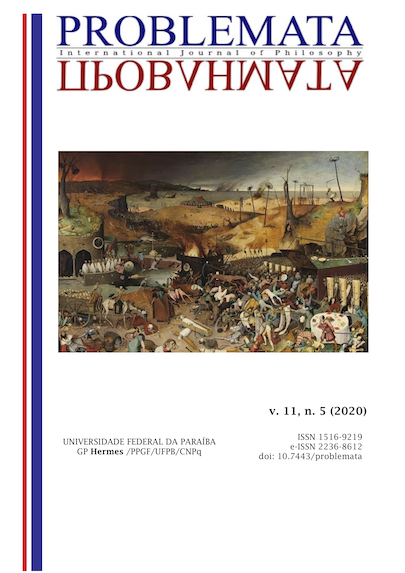GENERAL WILL, SOVEREIGNTY AND POLITICAL FREEDOM IN ROUSSEAU:
SOME PROBLEMATIZATIONS
DOI:
https://doi.org/10.7443/problemata.v11i5.51354Keywords:
General will, Popular sovereignty, Political freedomAbstract
Given the union of individuals by a convention, as idealized by Jean-Jacques Rousseau in The social contract, the political body that is formed will be directed by the general will, which gives unity to the people, considering the person of each associate, their assets and their freedom. Although the general will is the foundation for the maintenance of citizens' political freedom, it is possible to ask whether it will really prevail in all spheres of civil society, if the individuals who deliberate in the exercise of sovereignty are sufficiently informed about what is good common, or if they are led to accept what suits the Legislator, that is, if the general will is not manipulated, corrupted or deceived by this extraordinary figure, considered a guide endowed with superior intelligence to better lead citizens to pass good laws and preserving the common good. We are interested, then, in contrasting the very important issue of the popular participation of individuals in public subjects, highlighted by Rousseau, with the apparent limits that such participation would encounter in a republican state, and its consequences for political freedom.
Downloads
References
FORTES, Luiz Roberto Salinas. Rousseau: da teoria à prática. São Paulo: Ática, 1976.
KELLY, Christopher. "To Persuade without Convincing": The Language of Rousseau's Legislator. American Journal of Political Science, v. 31, n. 2, p. 321-335, 1987.
MONTEAGUDO, Ricardo. Entre o direito e a história: a concepção do legislador em Rousseau. São Paulo: Editora UNESP, 2006.
MOSCATELI, Renato. Quem faz as leis na república rousseauniana?. Veritas, Porto Alegre, v. 60, n. 1, p. 106-128, jan./abr. 2015.
NASCIMENTO, Milton Meira do. O Contrato Social – entre a escala e o programa. Discurso, São Paulo, n. 17, p. 119-129, 1988.
REIS, Claudio Araujo. Vontade geral e decisão coletiva em Rousseau. Trans/Form/Ação, Marília, v. 33, n. 2, p. 11-34, 2010.
ROUSSEAU, Jean-Jacques. Emílio; ou, Da Educação. Trad. Sérgio Milliet. 3. ed. Rio de Janeiro: Bertrand Brasil, 1995.
_______. O contrato social. Tradução de Antonio de Pádua Danesi. 3. ed. São Paulo: Martins Fontes, 1999.
_______. Discurso sobre a origem e os fundamentos da desigualdade entre os homens, precedido de Discurso sobre as ciências e as artes. 2. ed. Trad. Maria Ermantina Galvão. São Paulo: Martins Fontes, 1999(a).
_______. Economia (moral e política). In: Verbetes políticos da Enciclopédia. Tradução de Maria das Graças de Souza. São Paulo: Discurso Editorial; Editora UNESP, 2006.
SCOTT, John T. Politics as imitation of the divine in Rousseau’s “Social Contract”. Polity, v. 26, n. 3, p. 473-501, 1994.
STRAUSS, Leo. On the intention of Rousseau. Social Research, v. 14, n. 4, p. 455-487, 1947.
Downloads
Published
Issue
Section
License
Authors who publish with this journal agree to the following terms:
- Authors retain copyright and grant the journal right of first publication with the work simultaneously licensed under a Creative Commons Attribution License that allows others to share the work with an acknowledgement of the work's authorship and initial publication in this journal.
- Authors are able to enter into separate, additional contractual arrangements for the non-exclusive distribution of the journal's published version of the work (e.g., post it to an institutional repository or publish it in a book), with an acknowledgement of its initial publication in this journal.
-
- Authors are permitted and encouraged to post their work online (e.g., in institutional repositories or on their website) prior to and during the submission process, as it can lead to productive exchanges, as well as earlier and greater citation of published work (See The Effect of Open Access).





